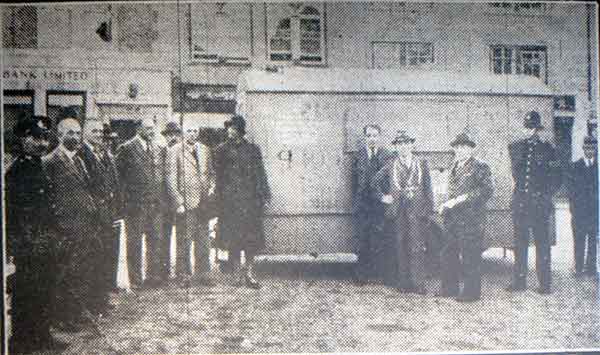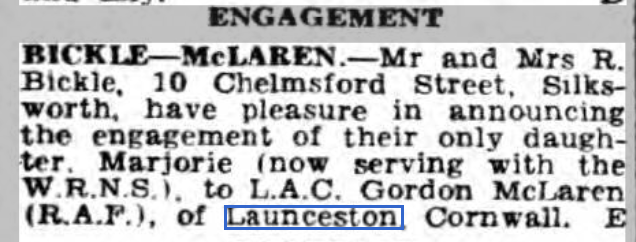.
On January 1st, Twenty-six Allied countries signed the Declaration by United Nations during the Arcadia Conference. On the 7th the Soviet Winter counter-offensive comes to a halt, after having pushed the exhausted and freezing German Army back 62–155 miles from Moscow. Operation Barbarossa’ had failed, with strong consequences for Germany and ultimately the war. For Launceston, 1942 was to prove to be a year of tremendous upheaval with the town becoming a garrison town with the influx later in the year of American soldiers now that the U.S. was now in the war.
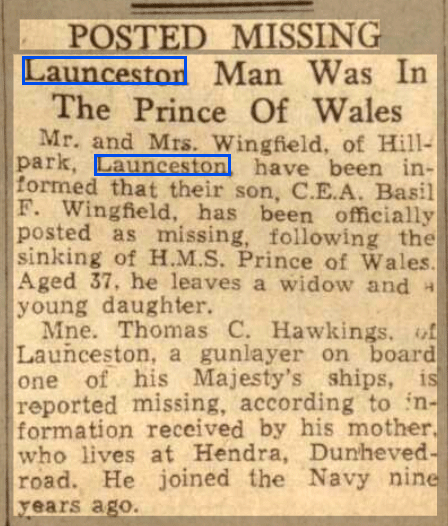


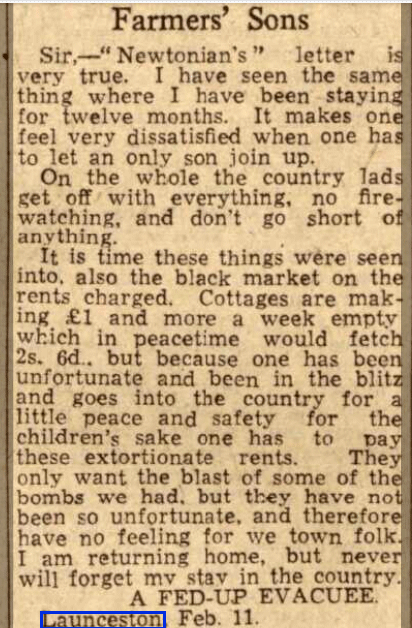
By the collection of 28 tons 12 cwt. 2 qrs. during January, Launceston Borough Council qualified for a prize in the £20,000 National Waste Paper Collection Contest. The campaign was taken up enthusiastically, and the Council had the assistance of the Women’s Voluntary Service and Boy Scouts, the special week yielding a total of 15 tons. Since the new Surveyor (Mr Colston) took the matter in hand, waste paper salvage had increased month by month, January being the best to date. The receipts from the month s collection were £125, which went to the relief of the rates. The Mayor (Ald. H. Hoskin) presided at meeting at Launceston on March 5th, when it was decided to form a cadet force unit for the borough and district. Between 20 and 30 boys immediately enrolled.
On Saturday, March 7th, the Launceston’s Warship Week had an auspicious start, when big concourse of people listened to Vice-Admiral Gordon Campbell, V.C., perform the opening ceremony. A long procession paraded the town and assembled in the Square. The Mayor (Ald. H. Hoskin) read a message from the Engineer Officer of H.M.S. Hatherleigh, which the town was then adopting, which he said, “Keep your sights on the target; shoot hard and often. We depend on you.” Mr T Horabin, M.P. for North Cornwall, said we had now got down to brass tacks, and unless we did our duty as civilians we were going to lose the war. The target of the town and district was £100,000.
That same week Canon W. H. Riggs, D.D.; Archdeacon of Bodmin and vicar of St. Mary Magdalene, gave an address to the Launceston Brotherhood on “Love our enemies.” He said the German founders of the Gestapo and the Gorman Army had perpetrated such atrocities, such horrors, such cruelties, that the idea of loving them seemed almost as absurd as hoping to tame a tiger by feeding it with Cornish pasties or saffron buns. The tales of horror in Poland, Rotterdam, and other occupied countries, and the treatment of the Jews beggared description. He concluded: “What is the end that God had for the German people? Was it to make a full end of them altogether? All of them were inclined to long for that in unguarded moments. But in the presence of God could they pray for the destruction of 90,000,000 Germans? The German nation was sick, needed to undergo a major operation, i.e., must suffer a military defeat on such a scale as to convince the people that their Army was not invincible.”
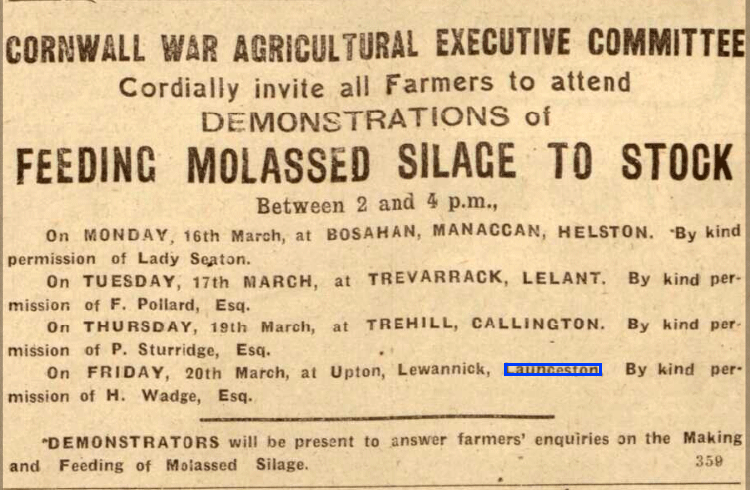
Launceston contributed £76,909 and parish amounts were: Altarnun, £583; South Petherwin. £1,760; North Petherwin. £2,354 (including the free gift of £20 to the Government from a village concert); Lawhitton, £1,425; Lezant, £3.413; Warbstow, £1,491; Boyton, £1,558; Werrington. £7,582; Tresmeer, £510; Laneast, £1,305; Egloskerry, £1.540; Lewannick, £1,134; North Hill and Coads Green, £1,705; Tregadillett. £334. The winner of the forecast competition was Mrs F. A. Williams, of 12, Tredydan Road, Launceston. who gave the figure as £101,250 5s. 6d. Patricia Carthew, aged 15, of the St. Josephs Convent School, won the poems competition.
During the year there were two other big funding drives – ‘Tanks for Attack Campaign,’ an endeavour to increase small savings by at least 20%, on the corresponding ten weeks in 1941, and £51, 922 10s. was raised, so that Launceston qualified for a light tank; and the ‘Schools Membership Drive,’ when Launceston finished four weeks effort with a membership percentage of 60.4 and holding the 18th place in the County.
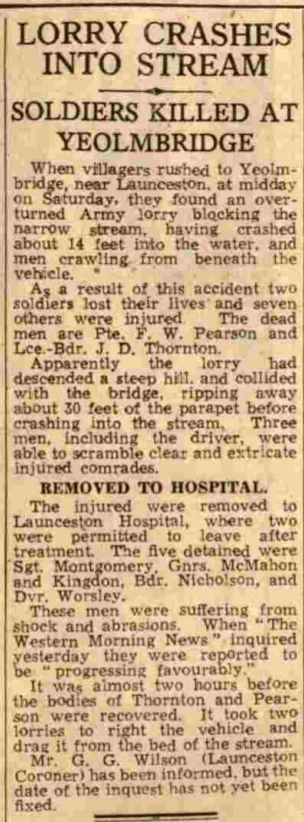
At the April meeting of Launceston Town Council, the Surveyor (Mr W. E. Colston) reported that they had now completed twelve months of salvage work, and the receipts totalled £306 7s. 10d. During that period 50 1/2 tons of paper had been salvaged. 14 3/4 tons of metal, 1 1/4 tons of rags, and 1 1/4 tons of bones. The price for scrap paper had been increased by £2 per ton. Up to then- the only unsatisfactory part of the scheme had been that in respect of tins which had been accumulating at the dumps. Arrangements were then being made for these to be cleared at 10s. per ton by the Ministry of Works. The Mayor (Ald. H. Hoskin) said it was a very satisfactory report, and he was glad to know that the tins were to be cleared. Councillor W. H. Gilbert said it was discouraging to householders to find that after they had neatly sorted their tins school children came along, took out the tins, and used them as footballs. Some went down the drains and were lost. It was reported that the £50 prize received in connection with the recent waste paper collection contest had been allocated as follows:—Red Cross, £12 10s.; Mrs. Churchill’s Aid-to-Russia Fund, £12 10s.; Launceston Hospital. £10; St. John Ambulance. £5: local Red Cross. £5; Nursing Fund, £5. The Town Clerk reported that he had received 26 applications for the Council’s house 23, Trelawny Cottages, and Mrs Tolman, wife of the former caretaker of the Castle, was selected.
Large blocks of granite were thrown a considerable distance in the early morning of April 25th, 1942, when four high-explosive bombs fell between Hawks Tor and Berah Tor, North Hill. No damage was caused, but owing to the nature of the ground, Wardens had difficulty in locating the craters which they caused.
An appeal was made to Launceston farmers the week commencing May 3rd, the woman publicity liaison officer of the Ministry of Works and Buildings, spoke to farmers on Market Day through a loud speaker van to talk about the Cornwall metal scrap drive. She told them that though they were already doing their bit towards the war effort as farmers, they should realise that without every available piece of scrap metal, no matter how small, armaments factories would not be able to work at full pressure. If they were thinking, she went on, that since we had been able to wait for their scrap metal during the two and a half years of war already, another few weeks would not matter, they were wrong. We used to get thousands of tons of scrap metal from the U.S.A. every week. Now we must rely on our own resources. For every ton of scrap 100 Bren guns could be made; three to four tons of scrap was sufficient for a Bren gun carrier, and 16 tons could produce a Valentine tank. If they thought of their old machinery in those terms, perhaps they would be more ready to part with it. On the night of May 24th and morning of the 25th, an invasion exercise in Launceston and district was carried out. The respective Home Guards took the role of defenders and various incidents were staged thoroughly testing the services.
On May 5th, a large number of incendiary bombs were dropped in an area between Smallacombe Farm and North Lodge, Lifton. Although many landed in cornfields and one near a hayrick, they caused no damage.
Prizes totalling £2,500 were offered during the period from May to July in connection with Launceston Borough Waste Paper Drive. From June 22nd to June 27th was to be Waste Paper Week, starting with door-to-door collection collaboration with the salvage stewards- There was a guessing competition for which prizes of £ 2 and £3 were offered for the nearest Correct estimates of tonnage collected in the borough during the May-July period. On June 23rd there was to be a novel effort, when an attempt was made to range a mile of books on the kerb from the Constitutional Club, through Westgate Street, and beyond.
During a discussion at the June meeting of Launceston Town Council, it was stated that a woman Fire Guard had complained that while she was on duty there were able-bodied men who remained in their beds. Mr F. Philp (Fire Guard staff officer) reported that progress was being made with the Fire Guard scheme. The town was divided into three areas. Personnel one area had been issued with steel helmets and had attended lectures. Lectures had also been given to personnel in another, but the area was not yet in working order, but it was hoped would be soon. the remainder of the town the position was not so satisfactory. Replying to the Mayor (Ald. H. Hoskin) Mr Philp said that people wishing to enrol could see one of the officers—Messrs Bright, Bryne, Bate, Prout —or himself. The Mayor then asked, “was it not a fact that in one area you have young women going out on duty and complaining that there are able-bodied men remaining in bed?” Mr Philp agreed. The Mayor made a reference to compulsion, and Mr Philp said he hoped it would not come to that. There would be paid officers, whose salaries would come out of the rates. At present no one, officers or personnel, was paid—it was voluntary from top to bottom, in spite of the fact that some people talked the officers having large salaries. The Town Clerk (Mr Stuart L. Peter) thought a strong appeal should be made from the Council for people in that area to join up. He had had a letter that morning stating that two officers would be visiting the town on Friday to offer what assistance they could in arrangements in regard to Fire Guards. The matter then dropped, the hope being expressed that the appeal from the Council would have good results.
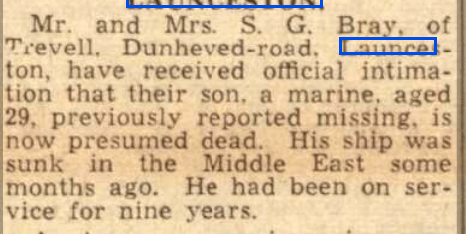
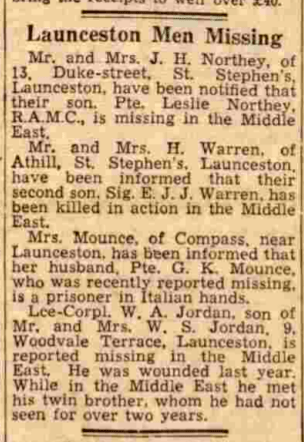
It was reported at the monthly Town Council Meeting held on September 21st, that the Deputy-Mayor (Mr R. Gregg), Messrs. Fitze and Uglow (the Mayor being an ex-officio member) had been appointed to the committee dealing with the management of the British Restaurant. The Mayor (Ald. Hoskin) said the patronage of the restaurant had increased practically every day since the opening ceremony. They were pleased with the manner which the work was being done by the staff under Mrs Ransome, and he would like to express appreciation of the work being done by the W.V.S., three of whom assisted each day. The Surveyor (Mr W. E. Colston)- appealed to the public to support the county salvage drive in connection with which Launceston’s target was 5 tons of paper, 2 1/2 tons of metal, 5 cwt. textiles, and 5 cwt. bones, to be collected in a fortnight. It was also discussed the motion of Mr Hicks, and seconded by Mr Fitze, the resolution passed on August 17th last that the Council do not purchase a motor vehicle, but a horse was rescinded. Mr Hicks said the reason why the purchase of a motor vehicle was turned down was on account the cost. A motor vehicle, he contended, would do the work of two horses, except cases of certain emergency, when r some outside help might be required. He saw no reason why a secondhand vehicle should not meet their requirements for the time being. He considered the motor vehicle would do 75 per cent of the work of two horses. The Mayor pointed out that if a motor lorry were acquired for the collecting of refuse a new roadway would have to be made to the dump. He did not think his committee would consider second-hand lorry of the haulage type. Mr Hicks: The approximate cost one horse is between £80 and £90. and lorry from £24o to £250. Mr Fulford said they wanted something more economical and something to speed up the work. He the Council in committee go further into the matter of obtaining suitable second-hand lorry. Mr Doidge seconded and it was agreed.
Launceston Rural District Council organised an intensive drive for salvage during the two weeks from September 19th to October 3rd for paper, old rags and clothes, bones, and rubber. The target for the two weeks was 7 tons of paper, 15cwt. of textiles, and 1 ton of bones.
The Club Shell Mex, Diadema, Buenos Aires, presented to the people of Launceston a mobile trailer kitchen (above) on Friday, October 2nd. The vehicle was handed over to the Mayor (Ald. H. Hoskin), on behalf of the town by Mr H. M. Medland, Deputy Regional Commissioner, Ministry of Home Security, the ceremony taking place in the Square, in the presence of a number of people. Mr Medland said the Regional Commissioner had requested him to ask the Mayor to accept the kitchen for the use of the people of the town. Continuing he said, the members of the club were mainly people of Argentine, but there were also British and Dutch members. They were a long way from the war and it demonstrated the feelings of sympathy they had for those in this, the country who were suffering from the effects of, the war. They realized that in this country we were right up in the front line, and in a town like Launceston they might be called upon to deal with large numbers of people. Only those towns and cities which had suffered the effects of concentrated bombing could understand what it was to be without the means of providing warm food in the homes of the people. When the gas and electricity had gone mobile kitchens had to come to the I rescue. Although the people of Launceston might think they were a long way from the actual scene of conflict, as a matter of fact, they were very much in the front line. It was absolutely essential for them to get the right outlook upon what was required. It was vitally important that the morale of the people should be maintained, and fortunately, there was no sign that they were less determined than ever to beat the Bosch. They had in this country an organization known as the Queen’s Messenger Service. The fact that the Mayor was asked to accept the kitchen on behalf of the town would supplement that service and help them in their preparation. Guns for defence, ‘planes for air cover, Home Guard and Civil Defence services were all necessary for their protection, so, too, were mobile kitchens. Each had its part to play. Extending a welcome to the Deputy Regional Commissioner, the Mayor said he was an outstanding personality in the city of Plymouth. His work in the past few years had been followed by the people of Launceston with great interest, and they owed him a debt of gratitude. Continuing, the Mayor expressed thanks and appreciation to their friends in Buenos Aires for their practical gift and kind thought. Though far from the fighting line, their heart was with them in the struggle through which this country and the Allies were passing. The town appreciated and valued the gift, and he would ask the Deputy Commissioner to send their warmest and most sincere thanks, with the assurance that the gift would be used, and used to the fullest extent, whether in Launceston or the country adjoining. The Mayor expressed thanks to the Deputy Regional Commissioner and also to Mr E. L. Marriott Regional Officer, Ministry of Home Security, who. he said, was always ready to render assistance to the various Home Defence services. The kitchen was then opened for the inspection of the public. Arrangements for the presentation were made by Mr E. J. Killingback, establishment officer, Ministry of Home Security.
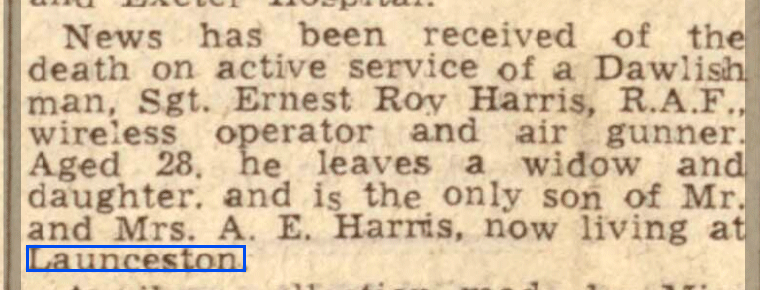
In regard to salvage activities in the borough during the months of August, September and October, the Surveyor at the October Town Council Meeting reported the following results: Paper collected, 27 tons 15 cwt., in money £183 14s. 3d.; metal, 10 tons 9 cwt, £12 6s. 5d.; rags, 1 ton 6 cwt., £12 17s. 2d.; bones, 1 ton 1 cwt., £3 10s.; total, 40 tons 11 cwt., £212 7s. 10d. During the Cornwall Salvage Drive, the target for the borough was 8 tons 15 cwt.. and they achieved 8 tons. Mr Fitze observed that no one showed a greater interest in the salvage question than their surveyor. He was proud he had done so well, and he congratulated him on the interest he had taken in the matter and the results achieved. Also at this meeting, Mr F. Philp (Fire Guard staff officer) stated that they lacked numbers, and spoke about the difficulty he was experiencing owing to many of the Fire Guards having to resign in account of their being required in the Home Guard.
The year ended with nearly 1,000 members of the services being entertained in the Town Hall on Christmas night, by the ladies of the Y.M.C.A. under the leadership of Mrs S. Fitze. The hall was decorated with bunting, holly, and large scenic canvasses on the walls. On the stage was a military dance band, and on the platform at the other end of the hall long trestle tables loaded with a variety of things to eat.
Visits: 105

